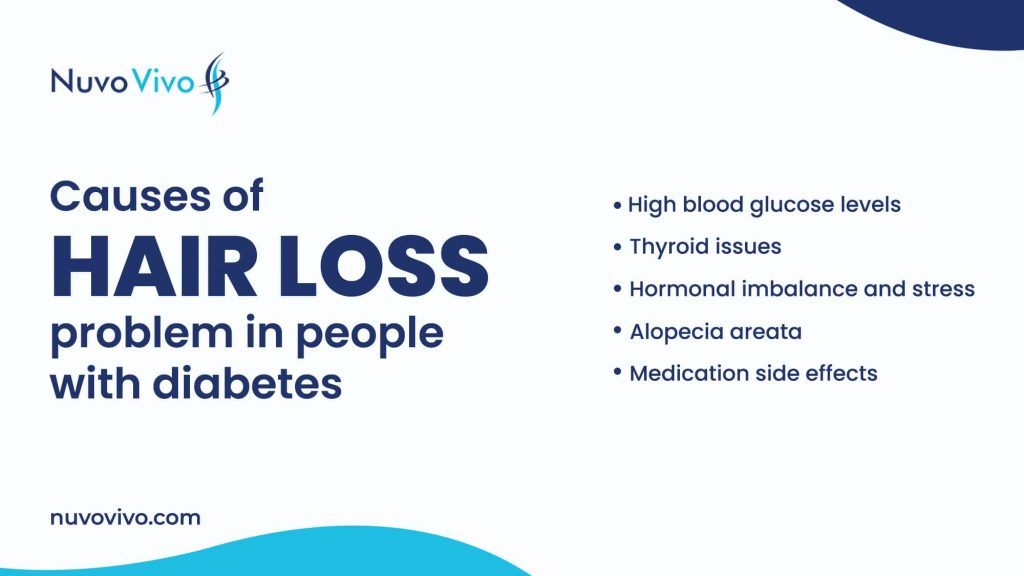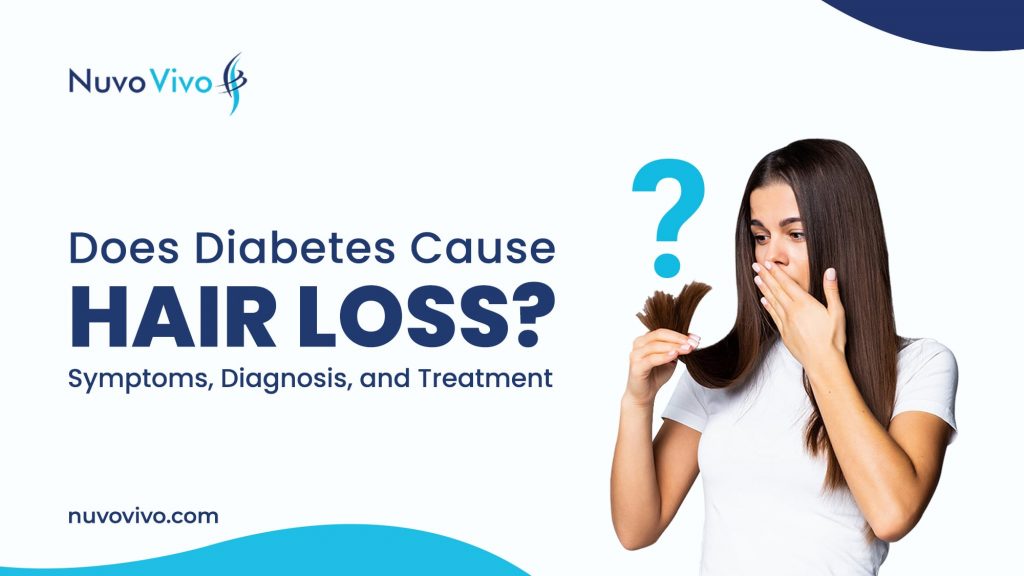Diabetes is a chronic condition that occurs when your pancreas doesn’t produce enough or any insulin, or your body cannot use the glucose for energy or a combination of these two conditions.
People diagnosed with diabetes probably know that the disease can affect different parts of the body. Diabetes symptoms vary depending on which type of diabetes you have. The common symptoms of diabetes include extreme thirst, blurry vision, frequent urination, more hunger, fatigue, numb or tingling feet, weight loss, etc.
But what about hair? People with diabetes are often left puzzled with a lot of concerns like can diabetes cause hair loss too, does diabetes medication cause hair loss, how can I prevent hair loss from diabetes meds, will hair loss from diabetes grow back, can insulin resistance cause hair thinning, and many more.
This article will explore the connection between diabetes and hair loss, including common causes, treatments, etc.
Can Diabetes Cause Hair Loss?
Does diabetes cause hair loss? This is one of the most asked questions by people.
High blood sugar levels and complications associated with diabetes can lead to hair thinning, hair fragility, or severe hair loss in some people.
Diabetes and hair loss are linked due to various causes like immune system disorders, elevated blood glucose levels, side effects of diabetes medications, etc. The normal hair growth cycles may get interrupted when glucose levels in the blood are out of range.
Can insulin resistance cause hair thinning? It is a major concern of people with diabetes as it is a symptom associated with diabetes. Insulin resistance is known to cause hair loss and hair thinning. Resistance to the hormone insulin can cause an increase in blood sugar levels and increases your risk for developing prediabetes and type 2 diabetes.
According to a 2014 study, researchers found links between Androgenic Alopecia, also known as male-pattern baldness, and insulin resistance.
ALSO READ: Hair Loss During Weight Loss
Causes of Hair Loss Problem in People with Diabetes

Hair loss in a person with diabetes can occur for a number of reasons, but the most common causes include those below.
High Blood Glucose Levels
If you have diabetes left uncontrolled or untreated, it means your blood sugar levels are too high. The high sugar levels in the blood can cause serious health problems. Moreover, persistently elevated glucose levels in the bloodstream for a long time can damage many blood vessels, organs, and tissues of your body.
Damage to blood vessels can limit blood flow to certain cells, which leads to less oxygen and fewer nutrients reaching the hair follicles than needed. This will negatively impact the hair growth cycle and lead to hair thinning and hair loss.
Thyroid Issues
People who have diabetes are at increased risk of developing some form of thyroid disorder. Therefore, if you have diabetes, you should get your thyroid checked at least once a year to ensure that you aren’t developing hypothyroidism or hyperthyroidism.
Especially, patients with type 1 diabetes are more likely to have co-occurring autoimmune thyroid diseases. If you have a severe thyroid condition and left it untreated, it may lead to hair loss because disruptions in the thyroid hormone can affect the hair cycle.
So it is advised to check and treat thyroid if you have.
Hormonal Imbalance and Stress
The physiological and psychological stress of living with a chronic illness like diabetes can affect hair growth because persistent stress can cause hormone fluctuations, leading to hair loss.
Alopecia Areata
People with diabetes are more likely to develop an autoimmune disease called alopecia areata. This condition occurs when the immune system attacks hair follicles, which cause hair to fall out in small circular patches from the head and other parts of the body.
Medication Side Effects
Certain medicines you take to treat your diabetes can interrupt the regular hair growth cycles, leading to hair thinning and slowing down your hair growth.
Does metformin cause hair loss? It is a commonly asked question as it is the first-line medication used for the treatment of type 2 diabetes. Even though metformin is not a known cause of hair loss, long-term use may increase the risk of vitamin B-12 deficiency, which can sometimes contribute to hair loss.
Read more on different B Vitamins here.
Symptoms and Diagnosis of Diabetes Hair Loss
Hair loss is one of the most common problems experienced by everyone at some point in their lifetime. It can appear in several different ways and can affect just your scalp or your entire body, depending on what is causing it.
For instance, if you experience sudden hair loss in small patches and are diagnosed with type 1 diabetes, you may have developed an autoimmune disorder known as alopecia areata. Moreover, people with diabetes are also more prone to getting skin disorders such as itching, bacterial infections, and fungal infections.
Your dermatologist can determine the cause of your hair loss through proper diagnosis.
To determine the cause of your hair loss, your dermatologist asks various questions about when hair loss began, whether your hair falls out in patches or clumps, whether it is sudden or gradual hair loss, and other details about your symptoms. Based on your medical history and physical examination, doctors can recognize whether the reason is genetic, medical, or environmental.
In addition, the factors like stress levels, other health conditions, medications, etc., will also be considered for accurate diagnostics. Blood Tests, Pull Tests, Scalp Biopsy, and Light Microscopy are some of the diagnostic tests performed to help pinpoint the connection between your diabetes and hair loss.
ALSO READ: How to Control PCOS with Diet Plan
Is Hair Loss from Diabetes Reversible?
If your hair loss is related to diabetes, then the next question that bothers you will be whether the hair loss from diabetes will grow back. Well, hair loss from diabetes is reversible in some cases.
Several treatments are available to prevent further thinning and loss of hair, including topical medications, Ayurvedic remedies, lifestyle modifications, etc. The best thing is that sometimes these treatments can also help grow back the hair in affected areas. However, the results of most of the hair loss treatments are more likely to cease when treatment is stopped.
The most effective way to slow or stop hair loss that results from diabetes is to adjust your diet, lifestyle, or medicine to keep your blood sugar levels within the range recommended by your doctor.
ALSO READ: How to Raise Low Blood Pressure
How to Treat Hair Loss from Diabetes?

It is significant to remember that no single treatment is appropriate for everyone. Depending on the cause of your hair loss, overall health, age, and the type of hair loss you are experiencing, the treatment options for diabetes hair loss will vary. Some of the ways to treat diabetes hair loss include:
Ayurvedic Treatments
You may have come to terms with the hair loss that comes with diabetes, but did you know that you may be able to combat the hair fall problem with Ayurveda. Now you may wonder how to treat hair loss from diabetes with Ayurveda.
According to Ayurveda, which is the Indian traditional holistic system of medicine, hair loss is the problem of Pitta dosha, wherein an excess of pitta is produced in the body. Many Ayurvedic herbs are thought to help control hair loss from diabetes, reverse hair thinning, and balance your doshas.
Ayurveda suggests giving a scalp massage with some Ayurvedic oils such as Fenugreek and Brahmi Oil, Curry Leaves and Coconut Oil, Amla Oil, Moringa Oil, Hibiscus Oil, etc., can promote hair regrowth.
Medications
Minoxidil, also known as Rogaine, is a topical over-the-counter (OTC) medication used to treat pattern hair loss in males and females. This is a popular medicine in foam or liquid form for diabetes hair loss that can help regrow hair on the scalp. You can apply it directly to the scalp. Minoxidil works to some extent in some people, as evidenced by clinical studies, but might not work for everyone.
Finasteride is another medication (oral tablet) used to treat male pattern hair loss. It is imperative to follow the instructions in the label while using any medication to minimize the risks and maximize the benefits.
Whether it is non-prescription medicine or prescription drugs, we recommend it’s critical to talk to a healthcare physician before pursuing any treatment plans.
Lifestyle Modification: Diet, Supplements, Exercise
A lifestyle change can help in the regulation and control of blood sugar. To better manage your blood sugar and hair fall problems associated with, eat healthy, well-balanced meals, engage in daily exercise, and take proper dietary supplementation to recover from nutrient deficiencies (if you have any).
Yoga and meditation are great ways to relieve stress and lower your blood sugar level. Moreover, if you’re insulin resistant, regular physical activity helps your body use insulin more efficiently.
The essential vitamins and minerals required to slow hair loss or help promote new growth include biotin, niacin, iron, zinc, fatty acids, selenium, vitamin D, keratin, and various other amino acids. Hair growth supplements like biotin are helpful for anyone experiencing hair loss and hair thinning from diabetes.
Some evidence shows people with diabetes may have blood biotin levels lower than normal. Biotin or vitamin B-7 is found naturally in foods like fish, meat, seeds, nuts, sweet potatoes, eggs, onions, and oats, often recommended for tackling hair fall problems.
We strongly recommend always consulting your medical provider before undertaking a new health care regimen.
ALSO READ: Cholesterol Myths and Facts
Other Effects of Diabetes on the Body
Diabetes affects the body in countless ways and can lead to devastating complications if left untreated. Some of the common effects of diabetes include:
- Risk of heart disease
- Fatigue and lack of energy
- Heavy thirst
- Risk of stroke
- Foot problems
- Excessive urination
- Problems with the kidney
- Visual disturbances
- Damaged blood vessels
- Nerve damage
- More likely to develop periodontal disease
Summary
Does diabetes cause hair loss? The answer is yes. The normal hair growth cycle can be affected by the combination of high blood glucose levels, stress and hormonal imbalance, and certain diabetes medication. Early diagnosis and treatment are necessary to keep the blood sugar levels under control and combat hair loss problems due to diabetes.

